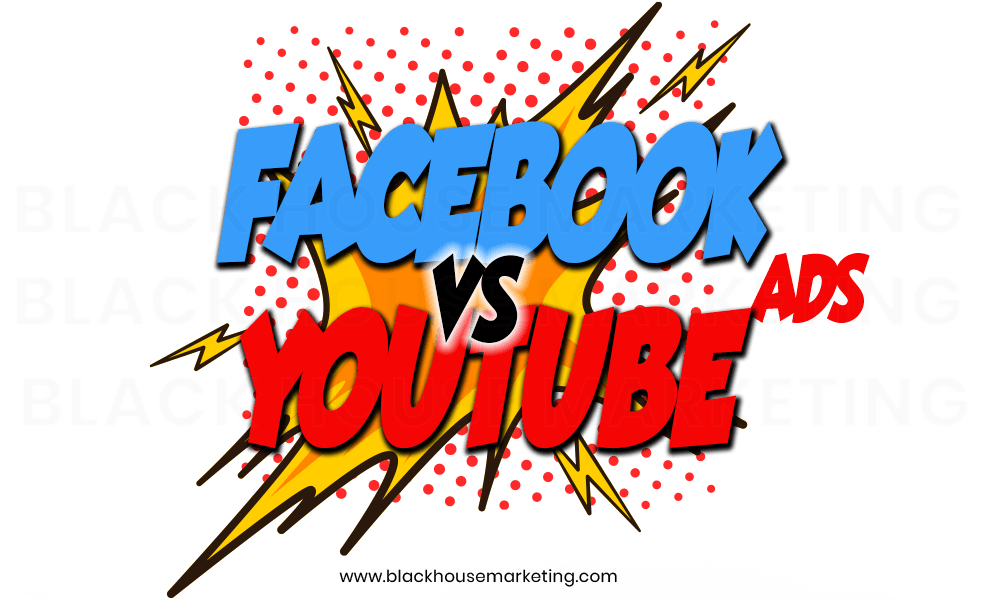The difference between Youtube and Facebook ads for Real Estate Lead Generation for buyer and seller leads online.

Push Vs. Pull Marketing
Have you ever went online and searched for a plumber when you didn’t need one? Probably not- but when you needed one, where would be the first place you would go to search “Plumbers near me?” For the majority of us, it would be Google. Unless you’re some sort of psycho and actually use Bing (lol).
On the other hand- Have you ever become aware of a new brand because of an online advertisement you saw? If you can’t recall one, think of Wayfair. How do you know what Wayfair is? Probably from an ad you saw online. The million dollar questions is- have you shopped on Wayfair? Do you know someone who has?
These are two entirely different scenarios. Yet both are incredibly effective. In the marketing world, we refer to this as Push & Pull Marketing. In essence, Push Marketing pushes you to a brand you don’t otherwise know about and weren’t directly searching for. Pull Marketing pulls you to something you were specifically looking for.
One is great for Brand Awareness & increasing Brand Recall (when you need something you will remember it because you’ve been exposed to the brand so many times), whereas the other is great for telling you “Oh, you were looking for me? Here I am!”
I’ll use more Real Estate related examples below.
Thanks to the power of the internet, you can target things strategically for both methods. Instead of relying on an out-dated shot gun approach like a billboard on the side of the road. For example, Wayfair doesn’t waste money on advertising the latest Boho Chic Coffee Tables to 15 year old’s. They make sure they put those ads in-front of people who might actually have an interested in the latest trends based on their online activity.
It’s not an exact science when you first launch a campaign, and there is constant testing of new audiences to determine who exactly is the person ready to buy the latest Boho Chic Coffee Table. Luckily with algorithms, they get smarter and smarter as time goes on, and without having to do nuclear physics, if you spend enough money on ads, you can collect enough data points to streamline the algorithm to deliver ads to the highest intent people right before they desire something.
Data points are the key drivers to the advertising world, because you visited x, y, z website, then talked to your bestie in messenger about a, b, c we know that you might be looking for product Q – because someone else with similar patterns did the same thing. The more traffic you have (ie. from spending money on ads) the more “data” points you have. In the Facebook world, what’s called a Facebook Pixel is this little data point scraper. Your Pixel is as strong as the amount of people you’ve collected data points from, which comes from spending money on ads or other traffic sources.
Anyways. That’s a whole lot of technical jargon you don’t necessarily need but it is good to know and understand and I’ll explain why shortly.
Facebook Ads For RE Leads
With Facebook ads, you’re doing Push Marketing. Meaning, you’re putting yourself in front of an audience who may be looking to buy or sell their house. If you have 0 data, you are really taking a billboard approach and just serving those ads to everyone and anyone. If you don’t know how to collect Pixel data, you will forever be casting a wide net. This is why a lot of people say “Facebook ads for real estate don’t work” – it’s because if you’re always putting your ads in front of everyone and anyone, you’ll be forever spinning your tires.
Where-as if you have spent a lot of money on data points you can tell the algorithm to only serve those ads to people who have the behavior of audiences you want. You can get incredibly in-depth with this using surveys and other means to further qualify people and create even more refined data. Ie. Only serve these ads to people with similar characteristics of those who answered “good credit” or “house hold income of $100k or more” on the survey.
It gets fairly in-depth and can get confusing fast. This is why some people get better leads on Facebook than others, and why so many people have a bad taste in their mouth for Facebook. The ads are incredibly easy to set up – but they aren’t easy to optimize unless you know what you’re doing and have a large budget to collect those data points.
The bigger the agency = the better the data. They’ve spent more money on data points and by default it makes them better. In my experience, I would recommend only using ad buying agencies (AKA lead generation companies) who are spending money on their owns ads. It takes a lot more budget to get business to business ads to work (ie. agencies attracting realtors) and it takes a lot more sales skills to convert a business owner than a consumer. This might take some mental gymnastics, but rookie agency owners who claim to get real estate leads don’t have the same data sets as larger agencies who can afford to advertise.
Facebook is great for brand awareness and scooping up people before they actually go searching for a realtor. You can continuously get in-front of them before they make that decision.
This means two things though, the time to get a Facebook lead to convert to someone buying or listing their home will be longer. However, it means it will be more cost effective to get that lead. Higher intent leads generally cost more money. That doesn’t mean the leads are bad, it simply means you’re spending your money differently and on a different timeline as it’s less competitive than someone actively searching for a realtor. The bonus though- you have the opportunity to get in front of your audience before they are actively seeking a realtor.
Facebook is better for initial Brand Awareness, & is more budget friendly but it takes longer to convert your leadsas they are less high intent than someone actively searching for a realtor.
Another thing to note is that Facebook is limited in their targeting options because of the Fair Housing Act, they may have got into trouble for discriminating people, and now there is no targeted search criteria that you can use. You have to start with a shot gun approach no matter what. Meaning you must always start at ground zero. Again- this goes back to data points though. If you have more data points, you can use those data points instead of having to “manually” figure out targeting.
YouTube Ads For RE Leads
Now we’ve talked a lot about actively searching for things, what the heck does that have to do with YouTube? Let me explain YouTube is owned by Google. Meaning that is uses Google’s data to serve ads.
In other words, YouTube is highly targeted based on Pull Marketing. Ie. People who have searched “Realtors in Texas” or “Realtors in Florida” or whatever location they are looking for.
Google also has some pretty cool features that you can use to do more in-depth targeting. Unlike Facebook where it’s open season, you can actually select highly in-depth characteristics such as income levels. So you can essentially force your ads in-front of people that have searched for Realtors In Ontario that also have an income level of $100k +.
That’s where YouTube comes in, normal Google Ad Words only go after search criteria and present answers based on what someone is looking for. Where as with YouTube, you can go one step further and deliver that Youtube Ad right after they searched for a realtor, and make sure they match other criteria such as income. Google Ad words doesn’t go as in-depth by going after certain characteristics it just spits out values based on search terms.
You might be wondering “If Google is so strong, why not just use Google?!” Well, Google is a complicated beast and it can take a massive budget and a long time to get on the front page of Google. Which can be done through Google Ad words or SEO. So it’s a lot more budget friendly, faster & easier to get exposure using YT. Plus like I had just mentioned, you can narrow your targeting down even more.
Since you’re using direct searches to deliver ads, your audience pool is a lot smaller because you are surgically targeting high intent people. The more narrow the targeting, the more competition to get your ads in front of those people- meaning you need more budget to get to them.
With Youtube, you get a more higher intent audience that will likely transact faster, but you’re going to need a bigger budget to get in front of them. It also takes a lot more time to test on YouTube than it does on Facebook because it is a much more complicated system, simply because it is so intricate with data.
Agencies who use YouTube effectively are a lot more sophisticated than agencies using Facebook because of the complexity of the system. From an advertising perspective, until you have mastered the complexities and intricacies of Facebook which can take years of experience and a lot of budget to test, you’re not ready for YouTube. It takes a breadth of understanding advertising alone to be able to navigate that ship.
Which one is better? (Facebook or Youtube)
It depends on your motives. If you’re looking to get in-front of your audience far before they ever search for a realtor to get the “first mover advantage” (as we say in the marketing world) and you have a smaller budget, Facebook is a great option. If you’re looking for high intent leads and have the budget & sales skills to be in a more competitive environment then YouTube.
Facebook is generally good for a newer real estate agent who doesn’t have as much budget or sales skills to duke it out with people who are actively searching “The Best Realtor In Florida” because they can get in front of their audience prior to that point & can graciously begin building a less cut-throat relationship with them. Where as YouTube is for someone who has a larger budget and has no problem competing with other realtors as the person who is opting into their direct response ads is also opting into others.
Omni Presence For Top Producing Realtors
For me, I prefer to have an Omni Presence, meaning I’m everywhere. Facebook, Youtube, Google, SEO, publications etc.

That’s really where you want to strive to be if you want to be a top producing agent; everywhere.
I say this with caution because at the end of the day, your leads are only as good as your sales processes and systems to convert them.
If you have no systems & have not put active effort into continually improving your sales skills, it doesn’t matter who you use or what platform- you’ll always be in the same boat.
That’s why there are so many naysayers out there about online lead generation. They simply did not have the systems to convert their leads and will perpetually complain about quality. Quality & intent are two different things, and it takes a skilled business person to understand that. Leads will always fall on the normal curve, some wrong numbers, some foundation kickers, and some absolute gold. It’s about how much time and effort you put into uncover the gold.
Recommendations for the Best Online Lead Generation for Realtors
If you are looking for either Facebook or YouTube leads (or both) check out our From Cold to Sold program.
We have a Pay Per Appointment, Pay per Close, and Unlimited Appointment Subscription plans available. We use both platforms to acquire leads, then we use an Inside Sales Agent or ISA team to call and further qualify your leads. We also have a CRM system to help with Text and SMS messages plus E-mail drip campaigns. To book a call with someone from our team schedule a call here.
However, if you’re not quite ready to pay for an agency to help you generate leads, we also have a highly cost effective course available to generate your own Facebook leads. You can buy that right here.
Jayde Gorling, BBA
Black House Marketing LLC
DBA From Cold to Sold
